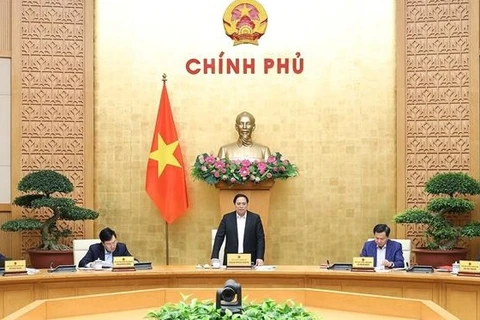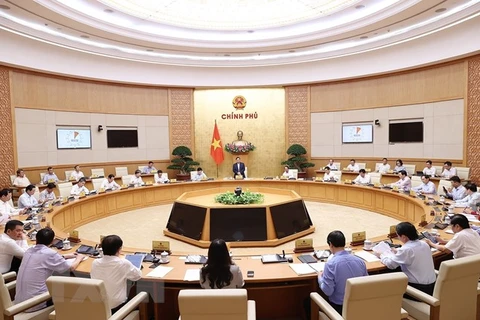Hanoi (VNA) – The State Bank of Vietnam (SBV) has been consistent in its policy to strictly control the credit flows into areas with high risks such as real estate and securities, and the policy will continue to be implemented in 2022 and following years, said SBV Deputy Governor Dao Minh Tu at a regular Government press conference on June 4.
Tu noted that at the same time, the SBV has always encouraged credit provision for areas that help facilitate economic development, including low-cost and social housing projects and houses for workers.
He reported that the SBV and commercial banks as well as ministries and sectors are working hard to implement the 40 trillion VND credit support package, which provides interest support of 2 percent to enterprises, business households and cooperatives, as part of the Government’s efforts to speed up post-pandemic socio-economic recovery and development. Under Decree 31/2022/ND-CP and Circular 03/2022/TT-NHNN guiding the enforcement of Decree 31, the support is also applicable to low-cost housing projects and housing projects for workers as well as those to upgrade old apartment buildings.
The SBV Deputy Governor said the real estate sector has continued to see normal growth. As of mid-April, the sector had total loan balance of 2.2 quadrillion VND (94.86 billion USD), up 10.19 percent over the figure at the end of 2021, representing a faster growth compared to the same period last year.
Total lending in the real estate sector accounts for 19.16 of that for the whole economy, he underlined.
Meanwhile, regarding the petrol price hike recently, Deputy Minister of Industry and Trade Do Thang Hai said that the ministry is working hard to ensure petrol supply sources for daily life and production activities, and coordinating closely with the Ministry of Finance in managing petrol and oil prices.
Hai pointed to three major solutions to reign in petrol prices, including effectively and flexibly utilising the fund for the stabilisation of petrol and oil prices, adjusting taxes and fees related to petrol and oil, and designing social welfare policies and measures to support businesses.
He noted that the rise in domestic petrol prices at 27.29-47.89 percent recently is lower than the increase in other country.
Deputy Minister of Finance Ta Anh Tuan said that after recent adjustments, taxes currently account for 29-31 percent in petrol prices and 13.3 percent in diesel oil prices, which are at low levels compared to the world average of about 45-60 percent, excepting for countries with large oil reserves.
Following the NA's adoption of a resolution on cutting of 50-70 percent in environmental protection tax rate on gasoline, oil, grease, the Finance Ministry has submitted to the Government a proposal on reducing the import-export tax rate on petrol from 20 percent to 12 percent./.
Tu noted that at the same time, the SBV has always encouraged credit provision for areas that help facilitate economic development, including low-cost and social housing projects and houses for workers.
He reported that the SBV and commercial banks as well as ministries and sectors are working hard to implement the 40 trillion VND credit support package, which provides interest support of 2 percent to enterprises, business households and cooperatives, as part of the Government’s efforts to speed up post-pandemic socio-economic recovery and development. Under Decree 31/2022/ND-CP and Circular 03/2022/TT-NHNN guiding the enforcement of Decree 31, the support is also applicable to low-cost housing projects and housing projects for workers as well as those to upgrade old apartment buildings.
The SBV Deputy Governor said the real estate sector has continued to see normal growth. As of mid-April, the sector had total loan balance of 2.2 quadrillion VND (94.86 billion USD), up 10.19 percent over the figure at the end of 2021, representing a faster growth compared to the same period last year.
Total lending in the real estate sector accounts for 19.16 of that for the whole economy, he underlined.
Meanwhile, regarding the petrol price hike recently, Deputy Minister of Industry and Trade Do Thang Hai said that the ministry is working hard to ensure petrol supply sources for daily life and production activities, and coordinating closely with the Ministry of Finance in managing petrol and oil prices.
Hai pointed to three major solutions to reign in petrol prices, including effectively and flexibly utilising the fund for the stabilisation of petrol and oil prices, adjusting taxes and fees related to petrol and oil, and designing social welfare policies and measures to support businesses.
He noted that the rise in domestic petrol prices at 27.29-47.89 percent recently is lower than the increase in other country.
Deputy Minister of Finance Ta Anh Tuan said that after recent adjustments, taxes currently account for 29-31 percent in petrol prices and 13.3 percent in diesel oil prices, which are at low levels compared to the world average of about 45-60 percent, excepting for countries with large oil reserves.
Following the NA's adoption of a resolution on cutting of 50-70 percent in environmental protection tax rate on gasoline, oil, grease, the Finance Ministry has submitted to the Government a proposal on reducing the import-export tax rate on petrol from 20 percent to 12 percent./.
VNA























